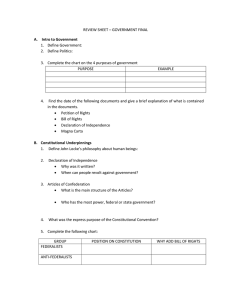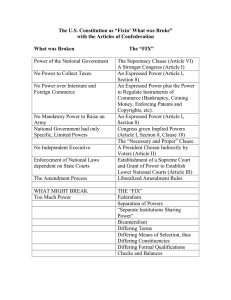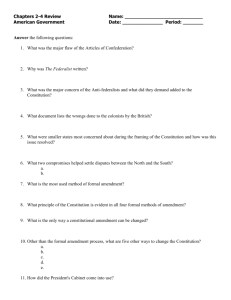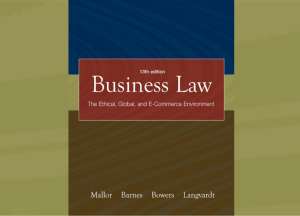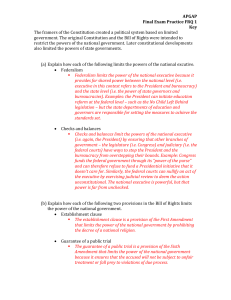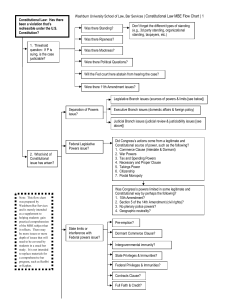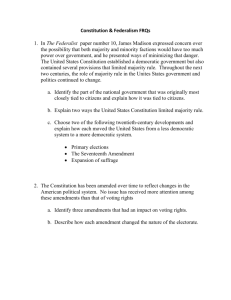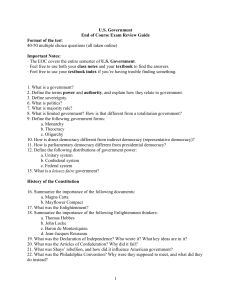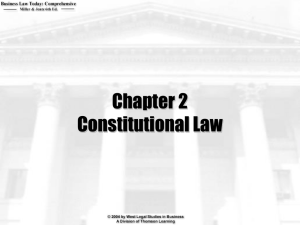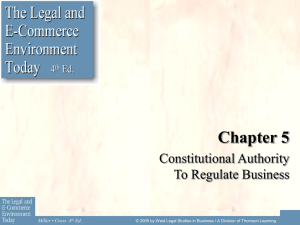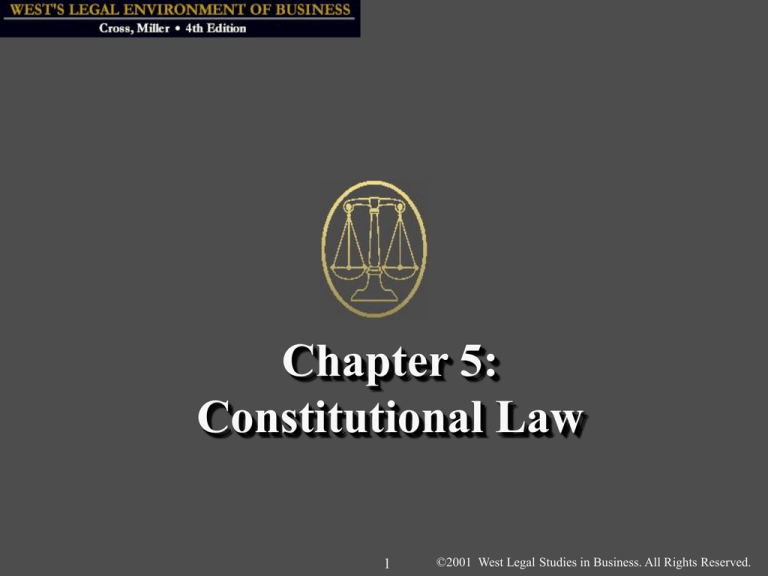
Chapter 5:
Constitutional Law
1
©2001 West Legal Studies in Business. All Rights Reserved.
History
Before the Revolutionary War, the States
wanted a confederation with weak national
government and very limited powers. After
the war, in 1787, States voted to amend
Articles of Confederation and create a new,
federal government that shared power with
States.
2
©2001 West Legal Studies in Business. All Rights Reserved.
§1: Constitutional Powers of
the United States Government
• Constitution established a federal form of
government with checks and balances
among three branches: executive, legislative
and judicial.
• National government has limited,
enumerated powers delegated from States.
• See the “Vote-Smart” site.
3
©2001 West Legal Studies in Business. All Rights Reserved.
U.S. Commerce Clause
• Power to regulate interstate commerce
defined in Gibbons v. Ogden (1824).
• Expansion to private businesses began with
Wickard v. Fillburn (1942).
• Today, Commerce Clause it authorizes the
national government to regulate virtually
any business enterprise, including internet.
• Limits: U.S. v. Lopez (1995), Alden v.
Maine (1999).
4
©2001 West Legal Studies in Business. All Rights Reserved.
State Commerce
• States possess inherent police powers to
regulate health, safety, public order, morals
and general welfare.
• State laws that substantially interfere with
interstate commerce will be struck down.
• Raymond Motor v. Rice (1978).
5
©2001 West Legal Studies in Business. All Rights Reserved.
U.S. Supremacy Clause
• Article VI of the states the U.S. Constitution
is the “Supreme Law of the Land.”
• In case of direct conflict between state and
federal law, state law is invalid.
• Congress can preempt states powers when it
chooses to act exclusively.
• Taxing Powers (Emerging Trends: Taxing
the Internet).
6
©2001 West Legal Studies in Business. All Rights Reserved.
§ 2: Business and
the Bill of Rights
• Bill of Rights are not absolute.
• Originally the Bill of Rights was a limit on
the national government’s powers.
• During the early 1900’s, the Supreme Court
applied the Bill of Rights to the States via
the “due process” clause of the 14th
amendment.
7
©2001 West Legal Studies in Business. All Rights Reserved.
Free Speech
• A fundamental (some would say “natural”)
right afforded highest protection by courts.
• Symbolic Speech.
• Texas v. Johnson (1989).
• R.A.V. vs. City of St.Paul (1992).
8
©2001 West Legal Studies in Business. All Rights Reserved.
Commercial Speech
Advertising is protected speech.
Restrictions must:
–
–
–
–
Implement substantial government interest;
Directly advance that interest; and
Go no further than necessary.
Case 5.1: Bad Frog Brewery v. NY State Liquor
Authority (1998).
9
©2001 West Legal Studies in Business. All Rights Reserved.
Corporate Political Speech
Afforded significant protection by the first
amendment, but not as much as the right of
natural persons.
• First National v. Bellotti (1978).
• Consolidated Edison v. Public Service
Commission (1980).
10
©2001 West Legal Studies in Business. All Rights Reserved.
Unprotected Speech
• Certain types of speech are not protected by
the first amendment:
– Slander.
– Pornography, Obscenity.
– Fighting Words.
• What about “Hate Speech”?
– Doe v. University of Michigan (1989).
11
©2001 West Legal Studies in Business. All Rights Reserved.
Freedom of Religion
• First amendment many neither prohibit the
“establishment” nor prohibit the “free
exercise” of religion.
• The first amendment does not require
complete “separation of church and state.”
• Mandates accommodation of all religions
and forbids hostility toward any.
– Zorach v. Clauson (1952).
12
©2001 West Legal Studies in Business. All Rights Reserved.
Freedom of Religion
• First amendment guarantees the “free
exercise” of religion.
• Employers must reasonably accommodate
beliefs as long as the employee has
“sincerely held” beliefs.
• Frazee v. Illinois (1989).
13
©2001 West Legal Studies in Business. All Rights Reserved.
Self-Incrimination
• Fifth amendment guarantees no person can
be compelled to testify against himself in a
criminal proceeding.
• Does not apply to corporations or
partnerships.
– Case 5.2: Verniero v. Beverly Hills Ltd
(1998).
14
©2001 West Legal Studies in Business. All Rights Reserved.
Searches and Seizures
• Fourth amendment requires warrant with
“probable cause”.
• Warrantless exceptions exist for
“evanescent” evidence.
• Searches of Business: generally business
inspectors must have a warrant.
• Marshall v. Barlow’s (1978).
15
©2001 West Legal Studies in Business. All Rights Reserved.
§3: Other Constitutional
Protections
• Privileges and Immunities Clause.
–Citizens of all states have same privileges.
• Full Faith and Credit Clause.
–Documents and judgments of a state are
honored by another state.
• Due Process.
• Equal Protection.
• Privacy Rights.
16
©2001 West Legal Studies in Business. All Rights Reserved.
Due Process
• 5th and 14th amendments provide “no person
shall be deprived of life, liberty or property
without due process of law.”
• Due Process includes both Procedural and
Substantive issues.
17
©2001 West Legal Studies in Business. All Rights Reserved.
Procedural Due Process
• Procedures depriving an individual of her
rights must be fair and equitable.
• Constitution requires adequate notice and a
fair and impartial hearing before a
disinterested magistrate.
18
©2001 West Legal Studies in Business. All Rights Reserved.
Substantive Due Process
• Focuses on the content or substance of
legislation.
• Laws limiting fundamental rights (speech,
privacy, religion) must have a “compelling
state interest.”
• Laws limiting non-fundamental rights
require only a “rational basis”.
19
©2001 West Legal Studies in Business. All Rights Reserved.
Equal Protection
• “Strict Scrutiny” test.
– Laws that affect the fundamental rights of
similarly situated individuals in a different
manner are subject to the “strict scrutiny” test.
– Any “suspect class” (race, national origin)
must serve a “compelling state interest” which
includes remedying past discrimination.
20
©2001 West Legal Studies in Business. All Rights Reserved.
Equal Protection
• Intermediate Scrutiny.
– Applied to laws involving gender or legitimacy.
– To be constitutional laws must be substantially
related to important government objectives.
– (Example: Illegitimate teenage pregnancy).
21
©2001 West Legal Studies in Business. All Rights Reserved.
Equal Protection
“Rational Basis” Test.
– Applied to matters of economic or social
welfare.
– Laws will be constitutional if there is a rational
basis relating to legitimate government interest.
– Case 5.3: WHS Realty v. Morristown
(1999).
22
©2001 West Legal Studies in Business. All Rights Reserved.
Privacy
• Fundamental right not expressly found in
the constitution, but derived from 1st, 5th and
14th amendments.
• Laws and policies affecting privacy are
subject to the compelling interest test.
23
©2001 West Legal Studies in Business. All Rights Reserved.
Law on the Web
•
•
•
•
•
Online Constitution at Cornell U.
See the “Vote-Smart” site on federalism.
Federalist Society.com.
ACLU.org.
Official U.S. Supreme Court site.
• Legal Research Exercises on the Web
24
©2001 West Legal Studies in Business. All Rights Reserved.
Emerging Issues:
Taxing Cyberspace
• States sales tax-sufficient “nexus”?
– Quill v. North Dakota (1992).
• Internet Tax Freedom Act.
– http://www.house.gov/chriscox/nettax/lawsums.
html
Return
25
©2001 West Legal Studies in Business. All Rights Reserved.


